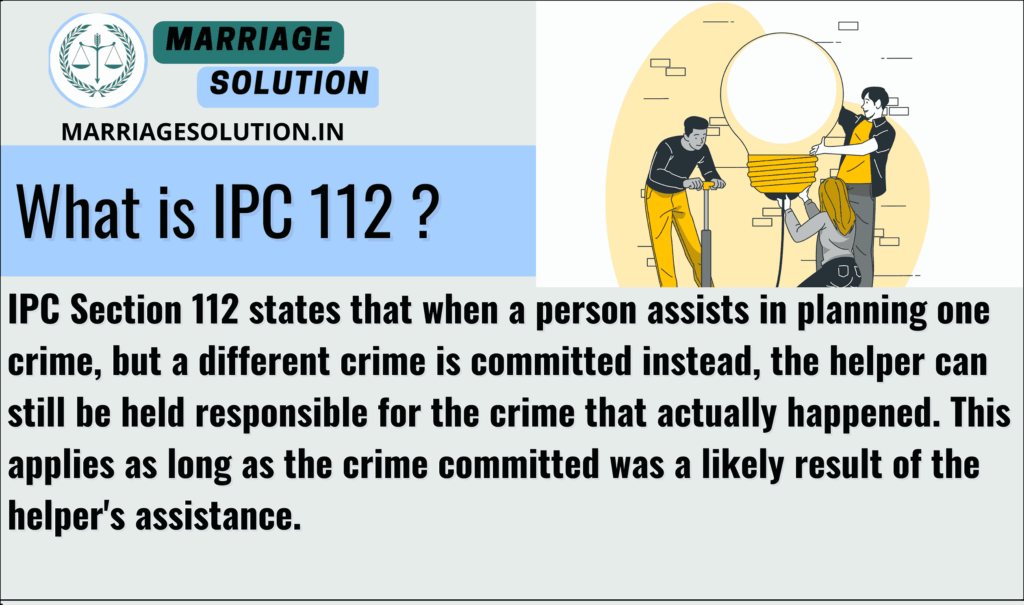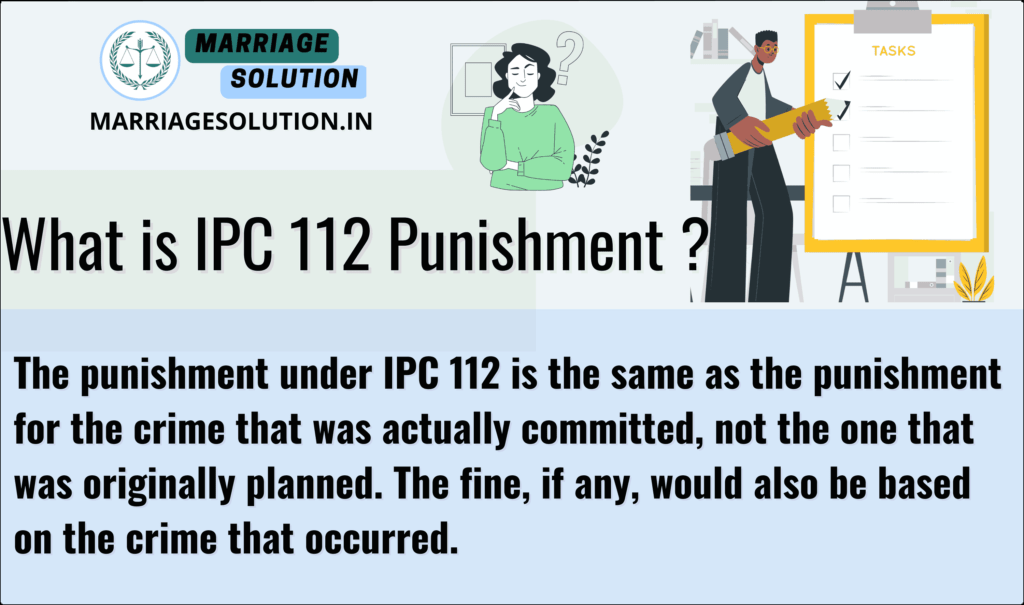Introduction of 112 IPC
Indian Penal Code (IPC) Section 112 deals with a person who helps plan a crime that ends up being different from what was originally intended. This section is important because it recognizes that sometimes criminal plans don’t go as expected, but those involved are still responsible for the outcome.
- Introduction of 112 IPC
- What is IPC Section 112 ?
- IPC Section 112 Overview
- IPC 112 Punishment
- 112 IPC bailable or not ?
- Section 112 IPC case laws
- Section 112 IPC in short information
- 112 IPC FAQs
- If you need support with court proceedings or any other legal matters, don’t hesitate to reach out for assistance.
What is IPC Section 112 ?
IPC Section 112 states that when a person assists in planning one crime, but a different crime is committed instead, the helper can still be held responsible for the crime that actually happened. This applies as long as the crime committed was a likely result of the helper’s assistance.

IPC Section 112 Overview
IPC Section 112 states that if the act committed is a probable consequence of the abetment and is different from the intended offense, the abettor is liable for the unintended consequences. This section emphasizes the extended liability of the abettor for any additional harm caused by the abetted
Key Points of IPC 112:
- Unexpected Outcomes : IPC 112 deals with situations where the crime that actually happens is different from what was planned. Even if you helped plan one crime, but something else happened instead, you might still be in trouble.
- Connection to Original Plan : For this law to apply, there needs to be a clear link between what you helped plan and what actually happened. The crime that occurred should be a possible result of your assistance, even if it wasn’t exactly what you intended.
- Responsibility for Consequences : This section says that you’re responsible not just for what you meant to happen, but also for what actually happened as a result of your help. It’s about taking responsibility for the consequences of your actions, even if they were unexpected.
- Knowledge and Intent : While you might not have intended the specific crime that happened, IPC 112 suggests that you should have known it was a possible outcome of your actions. It’s about being aware of the potential risks when you decide to help with illegal activities.
- Wide Range of Scenarios: “Many Possibilities” Explanation: This law can apply to many different situations. For example, if you help plan a robbery but someone gets hurt during it, you could be held responsible for the injury too, not just the theft.
- Legal Interpretation : How IPC 112 is applied can depend on how courts interpret the connection between the planned crime and what actually happened. Judges look at the facts of each case to decide if the helper should be held responsible for the unexpected crime.
IPC 112 Punishment
The punishment under IPC 112 is the same as the punishment for the crime that was actually committed, not the one that was originally planned. The fine, if any, would also be based on the crime that occurred.

112 IPC bailable or not ?
Whether IPC 112 is bailable or not depends on the nature of the crime that was actually committed. If that crime is bailable, then the charge under IPC 112 would be bailable. If it’s non-bailable, then IPC 112 would also be non-bailable.
Section 112 IPC case laws
- State of Maharashtra v. Wasudeo Ramchandra Kaidalwar (1981)
- Court: Supreme Court of India
- Key point: The court clarified that for Section 111 to apply, there must be a clear connection between the abetment and the crime committed.
- Outcome: The accused was acquitted as the prosecution failed to establish this connection.
- Importance: This case set a standard for proving abetment under Section 111 IPC.
- Jamuna Singh v. State of Bihar (1967)
- Court: Supreme Court of India
- Key point: The court held that mere presence at the scene of a crime doesn’t amount to abetment under Section 111.
- Outcome: The accused was acquitted as there was no evidence of active involvement in the crime.
- Importance: This case helps distinguish between passive presence and active abetment.
- Suresh v. State of U.P. (2001)
- Court: Supreme Court of India
- Key point: The court stated that to prove abetment, there must be evidence of instigation, conspiracy, or intentional aid.
- Outcome: The conviction was upheld as there was clear evidence of the accused’s involvement in planning the crime.
- Importance: This case provides guidance on what constitutes abetment under Section 111 IPC.
- Ranganayaki v. State by Inspector of Police (2004)
- Court: Supreme Court of India
- Key point: The court emphasized that the abettor must have the same intention as the principal offender.
- Outcome: The accused was acquitted as there was no proof of shared intention.
- Importance: This case highlights the importance of proving intention in abetment cases.
- Rajesh Kumar v. State of Haryana (2015)
- Court: Punjab and Haryana High Court
- Key point: The court held that abetment can be inferred from circumstantial evidence.
- Outcome: The conviction was upheld based on strong circumstantial evidence of abetment.
- Importance: This case shows that direct evidence isn’t always necessary to prove abetment.
- Ramesh Kumar v. State of Chhattisgarh (2001)
- Court: Supreme Court of India
- Key point: The court clarified that mere suspicion of abetment is not enough for conviction under Section 111.
- Outcome: The accused was acquitted due to lack of concrete evidence.
- Importance: This case emphasizes the need for solid proof in abetment cases.
- State of Punjab v. Gurmit Singh (1996)
- Court: Supreme Court of India
- Key point: The court held that active participation in the crime is not necessary for abetment under Section 111.
- Outcome: The conviction was upheld as the accused had clearly aided in planning the crime.
- Importance: This case shows that even behind-the-scenes involvement can lead to conviction.
- Muthu Kutty and Another v. State by Inspector of Police (2005)
- Court: Supreme Court of India
- Key point: The court stated that abetment requires a positive act or conduct on the part of the accused.
- Outcome: The accused was acquitted as there was no evidence of any positive act of abetment.
- Importance: This case helps define what constitutes an act of abetment.
- Sanju @ Sanjay Singh Sengar v. State of Madhya Pradesh (2002)
- Court: Supreme Court of India
- Key point: The court held that mere knowledge of a crime being committed doesn’t amount to abetment.
- Outcome: The accused was acquitted as there was no proof of active involvement in the crime.
- Importance: This case differentiates between knowledge of a crime and abetment.
- Kishori Lal v. State of M.P. (2007)
- Court: Supreme Court of India
- Key point: The court emphasized that the abettor must have the intention to instigate or facilitate the commission of the crime.
- Outcome: The conviction was upheld as there was clear evidence of intentional facilitation.
- Importance: This case underlines the significance of proving intention in abetment cases.
Section 112 IPC in short information
| Offense | Definition | Punishment | Bailable or Not |
|---|---|---|---|
| Abetment leading to further consequences | Liability for acts committed as probable consequences of abetment | Same as the punishment for the unintended act | Depends on the nature of the principal offense |
112 IPC FAQs
What is the main purpose of Section 111 IPC?
Section 111 IPC aims to hold people accountable who help in planning or facilitating a crime, even if they don’t directly commit it.
Can I be convicted under Section 111 IPC if I was present at the crime scene but didn’t participate?
Mere presence at the crime scene is not enough for conviction. The prosecution must prove your active involvement in abetting the crime.
What kind of evidence is needed to prove abetment under Section 111 IPC?
Evidence can be direct or circumstantial, but it must clearly show your involvement in instigating, conspiring, or intentionally aiding the crime.
If I knew about a crime but didn’t report it, can I be charged under Section 111 IPC?
Mere knowledge of a crime is not enough for abetment. There must be evidence of active participation or facilitation.
Can I be convicted under Section 111 IPC if the main crime was not successfully committed?
Yes, you can still be convicted for abetment even if the main crime was not completed, as long as there’s proof of your involvement in planning or facilitating it.
What does IPC Section 112 cover?
It covers the liability of an abettor for acts that are probable consequences of the abetment, even if those acts are different from what was intended.
Is the abettor liable for unintended consequences?
Yes, the abettor is liable for any probable consequences of the abetted act.
How is the punishment determined under IPC 112?
The punishment is the same as for the offense committed as a consequence of the abetment.
Is IPC Section 112 bailable?
The bailability depends on the nature of the principal offense abetted. If the principal offense is bailable, the abetment is also bailable.
What is the significance of IPC 112 in criminal law?
It ensures comprehensive liability for abettors, holding them accountable for the full extent of consequences resulting from their instigation or encouragement.
If you need support with court proceedings or any other legal matters, don’t hesitate to reach out for assistance.
Court or any other marriage-related issues, our https://marriagesolution.in/lawyer-help-1/ website may prove helpful. By completing our enquiry form and submitting it online, we can provide customized guidance to navigate through the process effectively. Don’t hesitate to contact us for personalized solutions; we are here to assist you whenever necessary!
